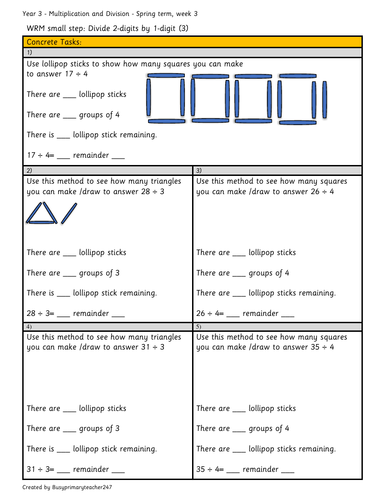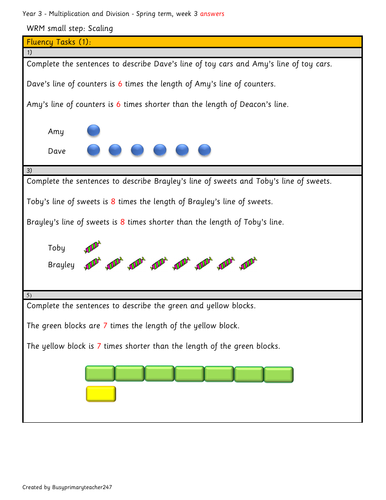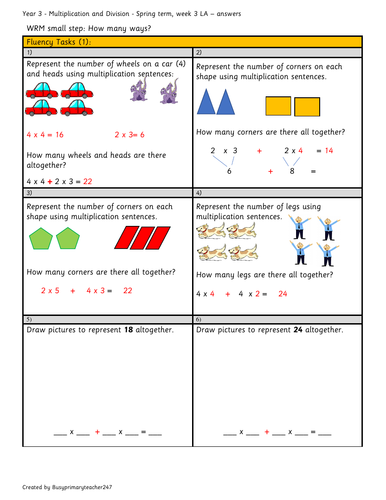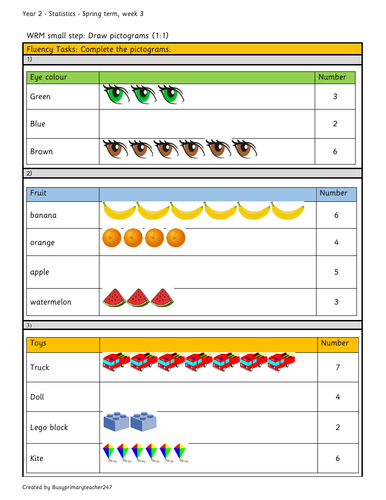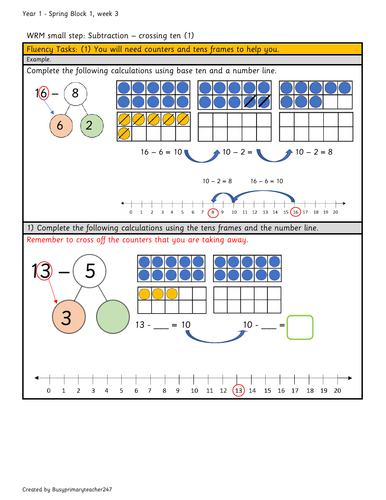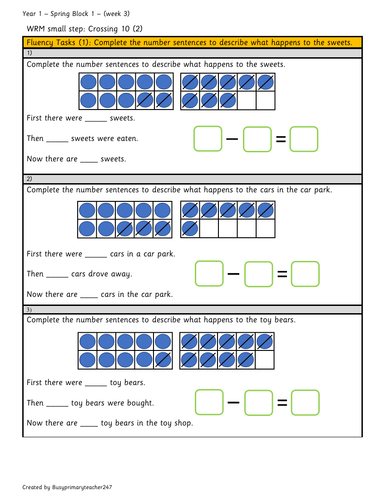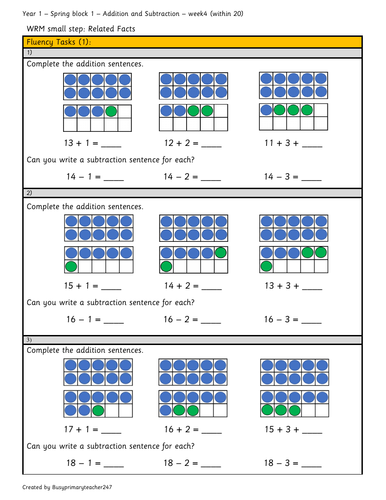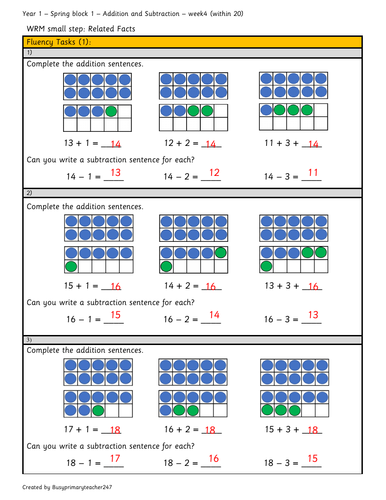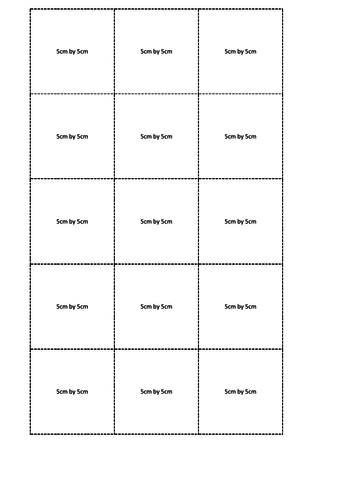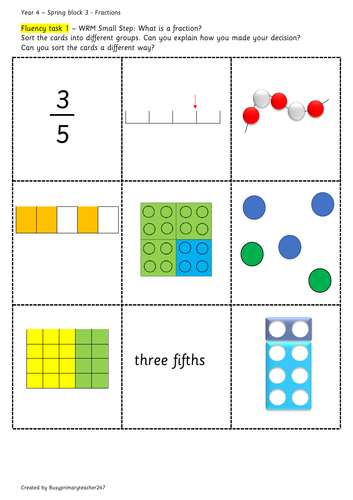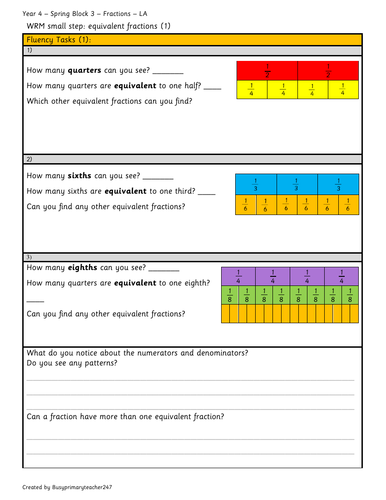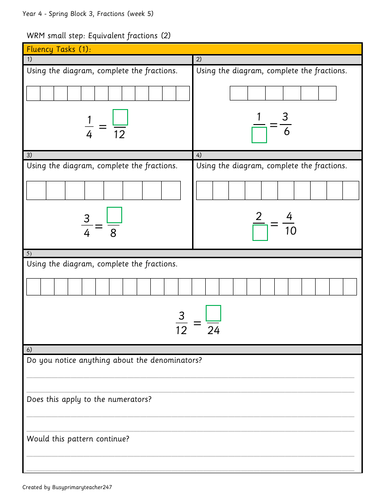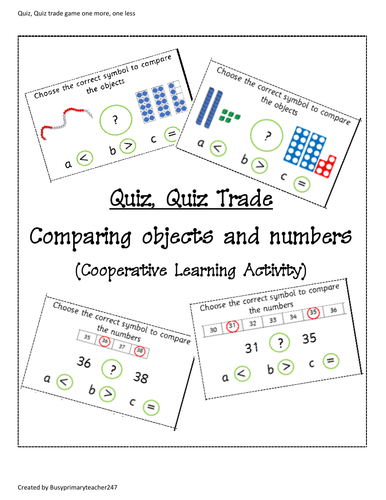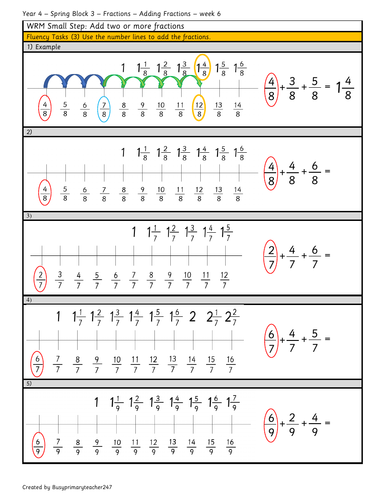132Uploads
174k+Views
66k+Downloads
All resources

Year 3 - Spring block 1 - Dividing 2-digits by 1-digit (3) UK and AU
This set of resources follows the concrete-pictorial-abstract method of Maths Mastery. It contains fluency, reasoning, and problem-solving tasks.
The worksheets are differentiated between lower ability and age-related and the answers are included :)
Links directly to WRM small steps:
-Divide 2-digits by 1-digit (3)
UK National curriculum links:
-Recall and use multiplication and division facts for the 3, 4 and 8 multiplication tables.
-Write and calculate mathematical statements for multiplication and division using the multiplication tables they know, including for two-digit numbers times one-digit numbers, using mental and progressing to formal written methods.
-Solve problems, including missing number problems, involving multiplication and division, including positive integer scaling problems and correspondence problems in which n objects are connected to m objectives.
Australian Curriculum (V8.3)
-Apply place value to partition, rearrange and regroup numbers to at least 10 000 to assist calculations and solve problems (ACMNA053)
-Recall multiplication facts of two, three, five and ten and related division facts (ACMNA056)
-Represent and solve problems involving multiplication using efficient mental and written strategies and appropriate digital technologies (ACMNA057)
-fluency includes recalling multiplication facts, using familiar metric units to order and compare objects, identifying and describing outcomes of chance experiments, interpreting maps and communicating positions.
-problem-solving includes formulating and modelling authentic situations involving planning methods of data collection and representation, making models of three-dimensional objects and using number properties to continue number patterns
- reasoning includes using generalising from number properties and results of calculations, comparing angles and creating and interpreting variations in the results of data collections and data displays.
I hope you find these resources helpful!
Your feedback is always welcome x

Year 3 - Spring block 1 - Scaling (week 3)
This set of resources follows the concrete-pictorial-abstract method of WRM and Maths Mastery. It contains fluency, reasoning, and problem-solving tasks linked to WRM small step - Scaling (week 3)
The worksheets are differentiated between lower ability and age-related and the answers are included :)
UK National curriculum links:
-Recall and use multiplication and division facts for the 3, 4 and 8 multiplication tables.
-Write and calculate mathematical statements for multiplication and division using the multiplication tables they know, including for two-digit numbers times one-digit numbers, using mental and progressing to formal written methods.
-Solve problems, including missing number problems, involving multiplication and division, including positive integer scaling problems and correspondence problems in which n objects are connected to m objectives.
Australian Curriculum (V8.3)
-Apply place value to partition, rearrange and regroup numbers to at least 10 000 to assist calculations and solve problems (ACMNA053)
-Recall multiplication facts of two, three, five and ten and related division facts (ACMNA056)
-Represent and solve problems involving multiplication using efficient mental and written strategies and appropriate digital technologies (ACMNA057)
-fluency includes recalling multiplication facts, using familiar metric units to order and compare objects, identifying and describing outcomes of chance experiments, interpreting maps and communicating positions.
-problem-solving includes formulating and modelling authentic situations involving planning methods of data collection and representation, making models of three-dimensional objects and using number properties to continue number patterns
- reasoning includes using generalising from number properties and results of calculations, comparing angles and creating and interpreting variations in the results of data collections and data displays.
I hope you find these resources helpful!
Your feedback is always welcome x
Bundle

Year 4 Spring Block 1 multiplication and division Units Weeks 1-3
This bundle contains all of the differentiated worksheets that match all 3 weeks of Spring Block 1. Answers are Included
All worksheets follow the concrete, pictorial and abstract method for maths mastery. They also include reasoning and problem-solving questions.
WRM Small Steps:
- 11 and 12 times-table
- Multiply 3 numbers
- Factor pairs
- Efficient multiplication
- Written methods
- Multiply 2-digits by 1-digit
- Multiply 3-digits by 1-digit
- Divide 2-digits by 1-digit (1)
- Divide 2-digits by 1-digit (2)
- Correspondence problems
UK Curriculum links:
- Recall and use multiplication and division facts for multiplication tables up to 12×12.
- Use place value, known and derived facts to multiply and divide mentally, including: multiplying by 0 and 1; dividing by 1; multiplying together three numbers.
- Recognise and use factor pairs and commutativity in mental calculations.
-Solve problems involving multiplying
and adding, including using the
distributive law to multiply two digit
numbers by one digit, integer scaling
problems and harder correspondence problems such as n objects are connected to m objects.
Australian Curriculum links:
-Represent and solve problems involving multiplication using efficient mental and written strategies and appropriate digital technologies (ACMNA057)
-Recall multiplication facts of two, three, five and ten and related division facts (ACMNA056)
Achievement Standards (AU):
- Understanding includes connecting names, numerals, and quantities.
- Fluency includes readily counting numbers in sequences, continuing patterns and comparing the lengths of objects.
- Problem-solving includes using materials to model authentic problems, sorting objects, using familiar counting sequences to solve unfamiliar problems and discussing the reasonableness of the answer.
- Reasoning includes explaining comparisons of quantities, creating patterns and explaining processes for indirect comparison of length.
I hope you find these useful,
Your feedback is always welcome x

Year 3 - Spring Block 1 (week 3) Small step - How Many Ways?
This set of resources follows the concrete-pictorial-abstract method of WRM and Maths Mastery. It contains fluency, reasoning, and problem-solving tasks linked to WRM small step - How many ways? (week 3)
The worksheets are differentiated between lower ability and age-related and the answers are included :)
UK National curriculum links:
-Recall and use multiplication and division facts for the 3, 4 and 8 multiplication tables.
-Write and calculate mathematical statements for multiplication and division using the multiplication tables they know, including for two-digit numbers times one-digit numbers, using mental and progressing to formal written methods.
-Solve problems, including missing number problems, involving multiplication and division, including positive integer scaling problems and correspondence problems in which n objects are connected to m objectives.
Australian Curriculum (V8.3)
-Apply place value to partition, rearrange and regroup numbers to at least 10 000 to assist calculations and solve problems (ACMNA053)
-Recall multiplication facts of two, three, five and ten and related division facts (ACMNA056)
-Represent and solve problems involving multiplication using efficient mental and written strategies and appropriate digital technologies (ACMNA057)
-fluency includes recalling multiplication facts, using familiar metric units to order and compare objects, identifying and describing outcomes of chance experiments, interpreting maps and communicating positions.
-problem-solving includes formulating and modelling authentic situations involving planning methods of data collection and representation, making models of three-dimensional objects and using number properties to continue number patterns
- reasoning includes using generalising from number properties and results of calculations, comparing angles and creating and interpreting variations in the results of data collections and data displays.
I hope you find these resources helpful!
Your feedback is always welcome x

Year 2 - WRM Spring block 2 - Statistics - Making Tally Charts (week 3)
This resource covers the first small step for Spring block 2 - Statistics - Making Tally Charts.
It is differentiated 2 ways and includes answers.
Enjoy x

Year 2 - WRM Spring Block 2 - Statistics - week 3 - Making Pictograms (1:1)
This resource covers Small step 2 of the WRM Spring block 2 (Statistics) Making Pictograms (1:1)
The worksheets are differentiated 2 ways and include answers.
I've also added the reasoning questions for this step and an extension task that allows children to make their own.
Curriculum Links:
-Interpret and construct simple pictograms, tally charts, block diagrams and simple tables.
I hope you find this useful!
Your feedback is always welcome x

Year 1 - Spring Block 1 - Week 3 - Small Step: Subtraction crossing 10 (1)
This resource covers Year 1 - Addition and Subtraction (within 20) - block 1 - Spring (week 3).
It follows the CPA approach to mastery and links to the WRM small step: 'Subtraction crossing 10 (1)'
I will be publishing the next small step for week 4 - 'Subtraction – Crossing 10 (2)' as soon as I can.
National Curriculum links:
- Represent and use number bonds and related subtraction facts within
20
- Read, write and interpret mathematical statements involving addition (+), subtraction (-) and equals (=) signs.
- Add and subtract one-digit and two-digit numbers to 20, including zero.
- Solve one-step problems that involve addition and subtraction, using concrete objects and pictorial representations, and missing number problems such as 7= ꙱ –9
Enjoy!
Your feedback is always welcome x

Year 1 - Spring block 1 - Addition and Subtraction (within 20) week 3.
This resource covers Year 1 - Addition and Subtraction (within 20) - block 1 - Spring (week 3).
It follows the CPA approach to mastery and links to the WRM small steps: 'Subtraction crossing 10 (1)' and 'Subtraction crossing 10 (2)'
National Curriculum links:
- Represent and use number bonds and related subtraction facts within
20
- Read, write and interpret mathematical statements involving addition (+), subtraction (-) and equals (=) signs.
- Add and subtract one-digit and two-digit numbers to 20, including zero.
- Solve one-step problems that involve addition and subtraction, using concrete objects and pictorial representations, and missing number problems such as 7= ꙱ –9
Enjoy!
Your feedback is always welcome x

Year 1 - Spring Block 1 - Week 3 - Small Step: Subtraction crossing 10 (2)
This resource covers Year 1 - Addition and Subtraction (within 20) - block 1 - Spring (week 3).
It follows the CPA approach to mastery and links to the 6th WRM small step: 'Subtraction crossing 10 (2)'
I will be publishing week 4 asap.
National Curriculum links:
- Represent and use number bonds and related subtraction facts within
20
- Read, write and interpret mathematical statements involving addition (+), subtraction (-) and equals (=) signs.
- Add and subtract one-digit and two-digit numbers to 20, including zero.
- Solve one-step problems that involve addition and subtraction, using concrete objects and pictorial representations, and missing number problems such as 7= ꙱ –9
Enjoy!
Your feedback is always welcome x

Year 1 - Spring block 1 - Addition and Subtraction within 20 (Week 4)
These resources follow the concrete-pictorial-abstract approach to Maths Mastery and also includes reasoning questions and answers.
Linked to small steps 'Related facts' and 'Compare number sentences' for week 4, Spring block 1.
Curriculum links:
-Represent and use number bonds and related subtraction facts within 20 -Read, write and interpret mathematical statements involving addition (+), subtraction (-) and equals (=) signs.
-Add and subtract one-digit and two-digit numbers to 20, including zero. -
Solve one-step problems that involve addition and subtraction, using concrete objects and pictorial representations, and missing number problems such as 7= ꙱–9
I hope you find this resource useful,
Your feedback is always welcome :)

Year 1 - Spring block 1 - Addition and Subtraction - Related facts (week 4)
This 11-page resouce follows the concrete-pictorial-abstract approach to Maths Master and also includes answers.
Linked to small step 'Related facts' for week 4, Spring block 1.
Curriculum links:
-Represent and use number bonds and related subtraction facts within 20 -Read, write and interpret mathematical statements involving addition (+), subtraction (-) and equals (=) signs.
-Add and subtract one-digit and two-digit numbers to 20, including zero. -
Solve one-step problems that involve addition and subtraction, using concrete objects and pictorial representations, and missing number problems such as 7= ꙱–9
I hope you find this resource useful,
Your feedback is always welcome :)

Year 4 - Spring Block 2 - Measurement - Area (week 4)
These resources link directly to WRM Spring block 2, Measurement - Area (week 4) and the first step: What is area?
The dimensions for the 5cm and 10cm squares prints out as close as I can get it (just 1-2mm out).
I've also included an 'Area Dice Game' as a free bonus activity for fast finishers or a warm-up activity.
Curriculum links:
- Find the area of rectilinear shapes by counting squares.
I hope this resource is useful, the remaining small steps for week 4 will be released as soon as I can create them :)
Your feedback is always welcome x
Bundle

Year 1 - Spring Block 1 - Addition and Subtraction (within 20) - Weeks 1-4
These resources follow the concrete-pictorial-abstract approach to Maths Mastery and also includes reasoning questions and answers.
Linked to small steps:
- Add by counting on
- Find &make number bonds
- Add by making 10
- Subtraction –Not crossing 10
- Subtraction –Crossing 10 (1)
- Subtraction –Crossing 10 (2)
- Related Facts
- Compare Number Sentences
Curriculum links:
-Represent and use number bonds and related subtraction facts within 20
-Read, write and interpret mathematical statements involving addition (+), subtraction (-) and equals (=) signs.
-Add and subtract one-digit and two-digit numbers to 20, including zero.
-Solve one-step problems that involve addition and subtraction, using concrete objects and pictorial representations, and missing number problems such as 7= ꙱–9
I hope you find this resource useful,
Your feedback is always welcome :)

Year 4 – Spring Block 3 – Fractions - What is a fraction?
This resources follows the concrete-pictorial-abstract approach to Maths Mastery and also includes reasoning questions. It is differentiated two ways and linked to WRM small step: What is a fraction?
Curriculum links:
- Recognise and show, using diagrams, families of common equivalent fractions.
I hope you find this resource useful,
Your feedback is always welcome :)

Year 4 – Spring Block 3 – Fractions - week 5 - Equivalent Fractions (1)
This resource follows the concrete-pictorial-abstract approach to Maths Mastery and also includes reasoning questions. It is differentiated two ways and is linked to WRM small steps: Equivalent fractions (1)
Curriculum links:
- Recognise and show, using diagrams, families of common equivalent fractions.
I hope you find this resource useful,
Your feedback is always welcome :)

Year 4 – Fractions – Spring Block 3 ( week 5) planning ideas incl.
These resources include varied fluency questions that focus on introducing fractions and equivalence. They follow a concrete – pictorial – abstract approach for mastery and include opportunities to use bar models and concrete materials. It also includes reasoning and problem-solving questions. Differentiated two ways and includes answers.
Linked to WRM small steps:
- What is a fraction?
- Equivalent fractions (1)
- Equivalent fractions (2)
Curriculum links:
- Recognise and show, using diagrams, families of common equivalent fractions.
I hope you find this resource useful,
Your feedback is always welcome :)

Year 1 - Spring block 2 - PV within 50 - week 6 resources and worksheets incl planning
This 16 file resource follows the concrete-pictorial-abstract approach to Maths Mastery and also includes reasoning questions, planning and cooperative learning activities.
I have created two extra resources to complement the fluency tasks and to make consolidation a bit more fun and interactive. I have also included more questions in each fluency task so that some now have 2 pages instead of just 1. This is to help extend fast finishers they can be used as homework tasks.
Linked to WRM small steps:
- One more one less
-Compare objects within 50
-Compare numbers within 50
Curriculum links:
- Count to 50 forwards and backwards, beginning with 0 or 1, or from any number.
- Count, read and write numbers to 50 in numerals.
- Given a number, identify one more or one less.
-Identify and represent numbers using objects and pictorial representations including the number line, and use the language of: equal to, more than, less than (fewer), most, least.
-Count in multiples of twos, fives and tens.
I do proofread each resource, but occasionally I may miss something. If you find an error please send me a message and let me know, so that I can fix it straight away.
I hope you find this resource useful,
Your feedback is always welcome :)

Year 4 – Spring Block 3 – Fractions - week 5 - Equivalent fractions (2)
These resources follow the concrete-pictorial-abstract approach to Maths Mastery and also include reasoning questions. They are differentiated two ways and is linked to WRM small step: Equivalent fractions (2)
Curriculum links:
- Recognise and show, using diagrams, families of common equivalent fractions.
I hope you find this resource useful,
Your feedback is always welcome :)

Year1 Quiz, Quiz, Trade Cooperative Learning activity based on comparing numbers and objects to 50
This is a fun and engaging way for children to learn about comparing numbers and objects to 50 through a cooperative learning activity called Quiz, Quiz, Trade.
This activity can be used as a warm-up or plenary and doesn't require too much preparation (If you choose to laminate it you can use it multiple times).
Enjoy x
Instructions are included in the resource.

Year 4 Count in fractions
This resource links to the WRM Spring block 3 Fractions unit and focuses on adding fractions with the same denominator. As requested, I have included more fluency and reasoning questions.
National curriculum links:
Solve problems involving increasingly harder fractions to calculate quantities, and fractions to divide quantities, including non-unit fractions where the answer is a whole number.
Add and subtract fractions with the same denominator.
Enjoy x

